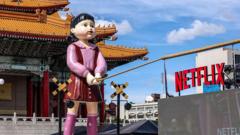As preliminary results emerge from the first-round presidential elections held on Sunday, Bolivia stands on the verge of electing its first non-left wing president in nearly twenty years. Senator Rodrigo Paz Pereira and former president Jorge Quiroga secured the top two spots in what promises to be a contentious run-off scheduled for October, after neither candidate achieved the necessary majority. Paz Pereira, representing the Christian Democratic Party, emerged as a surprising frontrunner, defying opinion polls that had favored businessman Samuel Doria Medina. His campaign has been marked by a promise to redistribute funds and combat corruption, encapsulated in the slogan "capitalism for all, not just a few."
Bolivia on the Brink of Historical Shift as Non-Left Wing Candidate Leads Election

Bolivia on the Brink of Historical Shift as Non-Left Wing Candidate Leads Election
Bolivia is poised to break a two-decade trend of left-wing governance, with Rodrigo Paz Pereira leading the first-round presidential election results.
The potential shift in leadership suggests a drastic change in Bolivia's foreign policy, likely tilting toward the United States while distancing from close ties established during the leadership of the socialist Movimiento al Socialismo (MAS) party. This shift could play a significant role in attracting foreign investment, especially in Bolivia's rich lithium reserves, crucial for manufacturing batteries for electric cars and tech devices.
However, the timing is critical, as Bolivia grapples with one of its worst economic crises in recent history, characterized by shortages of fuel and food, coupled with rampant inflation. The current president, Luis Arce, has opted not to seek re-election amidst widespread dissatisfaction. Reports indicated significant public sentiment for change, with voters expressing their dismay at the MAS party, evidenced by hostile confrontations faced by incumbent candidates on election day.
The past two decades have been extensively marked by the influence of former president Evo Morales, who, despite being barred from running again, still holds sway over many supporters. The lack of his name on the ballot has stirred controversy and unrest, particularly among his loyalists. The ongoing power struggle within MAS, exacerbated by Morales's controversial political strategies and personal scandals, underlines the fragile state of Bolivian politics as it enters a new era with a potential rightward shift.
However, the timing is critical, as Bolivia grapples with one of its worst economic crises in recent history, characterized by shortages of fuel and food, coupled with rampant inflation. The current president, Luis Arce, has opted not to seek re-election amidst widespread dissatisfaction. Reports indicated significant public sentiment for change, with voters expressing their dismay at the MAS party, evidenced by hostile confrontations faced by incumbent candidates on election day.
The past two decades have been extensively marked by the influence of former president Evo Morales, who, despite being barred from running again, still holds sway over many supporters. The lack of his name on the ballot has stirred controversy and unrest, particularly among his loyalists. The ongoing power struggle within MAS, exacerbated by Morales's controversial political strategies and personal scandals, underlines the fragile state of Bolivian politics as it enters a new era with a potential rightward shift.


















